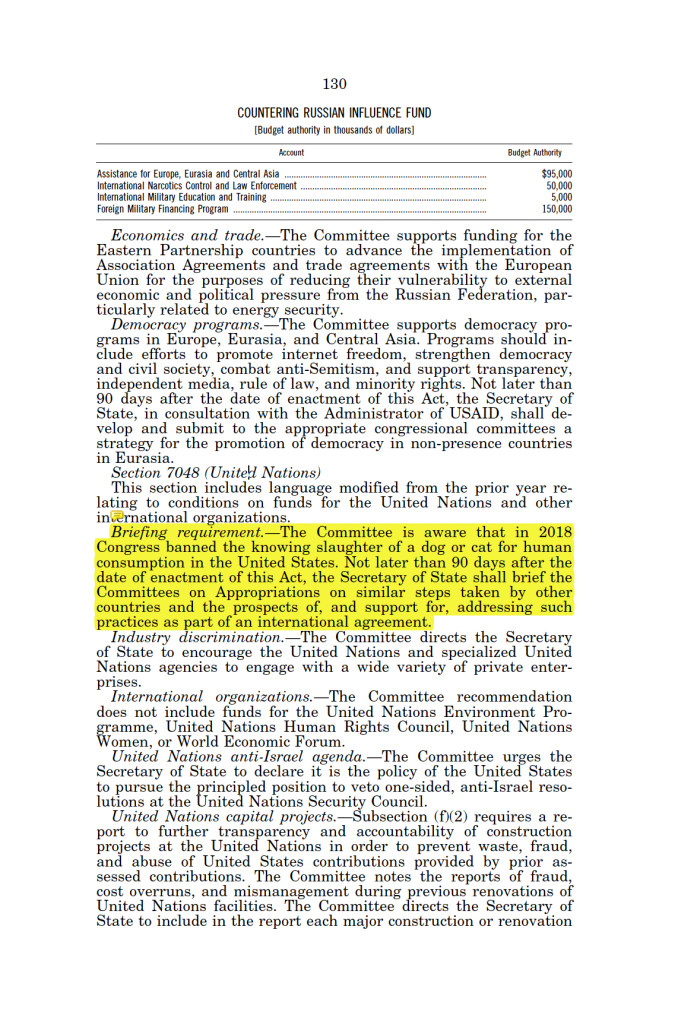WASHINGTON, D.C. / ACCESSWIRE / September 21, 2023 / In an unprecedented move, the United States Congress has taken a significant stride by integrating the language of the "International Agreement to Prohibit the Eating of Dogs and Cats" into the forthcoming Appropriations Bill. This momentous development not only showcases the growing international commitment to combat the brutal practice of consuming these beloved animals but also underscores the significant role the Appropriations Bill plays in driving positive global change.

"The Committee is aware that in 2018 Congress banned the knowing slaughter of a dog or cat for human consumption in the United States. Not later than 90 days after the date of enactment of this Act, the Secretary of State shall brief the Committees on Appropriations on similar steps taken by other countries and the prospects of, and support for, addressing such practices as part of an international agreement."
The Appropriations Bill, an integral legislative instrument responsible for allocating funds to diverse governmental programs and initiatives, has historically held the key to shaping policies and priorities within the United States. The inclusion of the "International Agreement to Prohibit the Eating of Dogs and Cats" speaks volumes about the nation's determination to address issues that transcend its borders and establish itself as a beacon of change on the global stage.
Furthermore, it is worth noting that the United States has already taken a strong stance against the consumption of dog and cat meat. In 2018, the passage of the Farm Bill included a comprehensive ban on the slaughter, trade, and consumption of dogs and cats for human consumption.
Genlin, the founder of the World Dog Alliance, expresses profound gratitude to the United States Congress for its leadership and foresight in taking a bold stance against the consumption of dog and cat meat. This momentous step is a testament to the tireless efforts of animal rights activists and compassionate politicians who have relentlessly advocated for change and rallied behind a collective mission to end animal cruelty.
As the United States paves the way for a better world for companion animals, the World Dog Alliance calls upon nations across the globe to heed this significant example and join hands in eradicating the consumption of dog and cat meat. By enacting laws and regulations that align with the principles of the "International Agreement to Prohibit the Eating of Dogs and Cats," nations can collectively put an end to this barbaric practice.
"Today's inclusion of the 'International Agreement to Prohibit the Eating of Dogs and Cats' in the U.S. Appropriations Bill is a resounding declaration that the world is awakening to the urgent need to protect the welfare of dogs and cats. We urge governments worldwide to seize this opportunity and contribute to a global movement that prioritizes compassion over cruelty," stated Genlin, founder of the World Dog Alliance.
The World Dog Alliance remains steadfast in its commitment to raising awareness and driving legislative reforms that safeguard the well-being of dogs and cats across the world. This momentous achievement is a testament to the collective determination of individuals and organizations who envision a world where animals are treated with the respect and kindness they deserve.
About World Dog Alliance:
The World Dog Alliance (WDA) is a global non-profit organization dedicated to ending the consumption of dog and cat meat and promoting animal welfare. Through education, advocacy, and collaboration, the WDA strives to create a world where animals are treated with respect and kindness.
Contact Information
Him Lo
Director of Legal Affairs
[email protected]
(852) 25196366
SOURCE: World Dog Alliance





